 Petzlover
Petzlover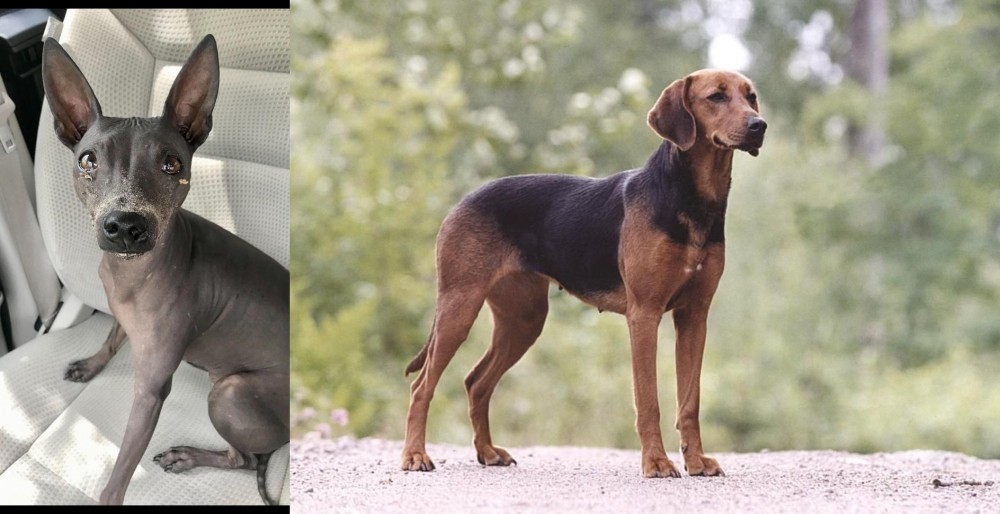 American Hairless Terrier is originated from United States but Schillerstovare is originated from Sweden. American Hairless Terrier may grow 16 cm / 6 inches shorter than Schillerstovare. American Hairless Terrier may weigh 13 kg / 28 pounds lesser than Schillerstovare. Both American Hairless Terrier and Schillerstovare has almost same life span. Both American Hairless Terrier and Schillerstovare has almost same litter size. Both American Hairless Terrier and Schillerstovare requires Low Maintenance.
American Hairless Terrier is originated from United States but Schillerstovare is originated from Sweden. American Hairless Terrier may grow 16 cm / 6 inches shorter than Schillerstovare. American Hairless Terrier may weigh 13 kg / 28 pounds lesser than Schillerstovare. Both American Hairless Terrier and Schillerstovare has almost same life span. Both American Hairless Terrier and Schillerstovare has almost same litter size. Both American Hairless Terrier and Schillerstovare requires Low Maintenance.
 Derived from the Rat Terrier, the American Hairless Terrier was born in a litter of Rat Terriers in 1972.
Derived from the Rat Terrier, the American Hairless Terrier was born in a litter of Rat Terriers in 1972.
The evolution of this breed is very different from other hairless breeds. The American Hairless Terrier was independently developed when a hairless pup was produced in a litter of normal Rat Terriers. The owners of this pup, Edwin and Willie Scott attempted to breed her to other Rat terriers but were not successful in having another hairless pup until years later. Then they had a litter with one male and one female hairless puppy.
From that point on they worked with a veterinarian and a geneticist to develop the breed until it was accepted as a separate breed from the Rat Terrier in 2004 and accepted into the AKC in 2016.
The breed is very rare and with hairless dogs breeding only produces about two thirds of the litter as hairless and one third as coated. If a hairless is bred to a coated terrier, the chances of getting hairless puppies are 50% hairless and 50% coated. It is very rare to get a hairless when breed two coated terriers. The difference between the American Hairless Terrier and other hairless breeds is that the hairless gene in most breed is a lethal dominant gene, but in the AHT it is a recessive gene.
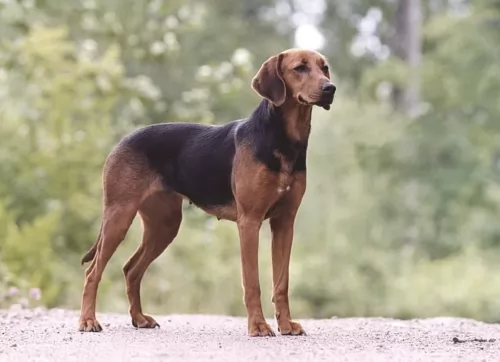 The Schillerstövare originated in Sweden, being named after a Swedish farmer, Per Schiller. After he died, the dog was named Schillerstövare in 1907, and was Sweden's first native dog breed.
The Schillerstövare originated in Sweden, being named after a Swedish farmer, Per Schiller. After he died, the dog was named Schillerstövare in 1907, and was Sweden's first native dog breed.
The Swedish Kennel Club recognised this dog in 1907 and it is also recognised by the Federation Cynologique Internationale as well as a number of minor kennels and dog clubs.
The dog has always been used as a hunting dog and the English Foxhound is the e foundation for this breed.
 The American Hairless Terrier is similar to it’s breed of origin, the Rat Terrier, and the coated AHT looks very much like a Rat Terrier. They are small to medium in size, very muscular and have more refined features than the Rat Terrier. Their round eyes can be a variety of colors including amber, brown, grey, turquoise and blue. The tail is not docked but rather long and thin.
The American Hairless Terrier is similar to it’s breed of origin, the Rat Terrier, and the coated AHT looks very much like a Rat Terrier. They are small to medium in size, very muscular and have more refined features than the Rat Terrier. Their round eyes can be a variety of colors including amber, brown, grey, turquoise and blue. The tail is not docked but rather long and thin.
The AHT might have eyebrows and whiskers or they might only have whiskers. Their head is broad, and wedge shaped with upright ears. They are an energetic, social and intelligent dog.
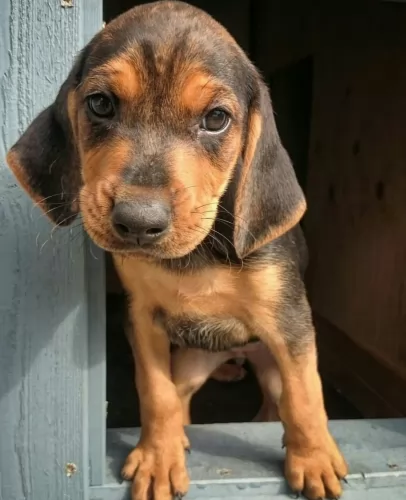 The Schillerstövare is a medium to large sized dog. They’re athletic and muscular.
The Schillerstövare is a medium to large sized dog. They’re athletic and muscular.
Standing at between 53–61cm in height and weighing in the region of 18–25kg, the coat of the dog is fairly short and harsh, with the color being black and tan.Sometimes you’ll see some white markings on the chest and paws.
The head is domed, the eyes brown, bright and alert and the ears of the dog are broad, medium length and floppy. The long tail is carried low or held out when running or alert.
If you allow your Schillerstovare to have puppies, you can expect between 3 to 7.
The Schillerstovare is a calm dog but he can get petty lively when there’s a game to be had. He gets on well with well disciplined children who have been taught to be kind and respectful to animals. He also gets on well with pets in the home. Just like with most other dogs, he will need to be trained and socialized as he is a strong willed, confident, dominant dog.
He is friendly and active but will be somewhat reserved around strangers.These dogs will require a lot of exercise and will need quite a bit of space too. They aren't well suited to small properties in the city. He will need a daily walk but also a chance to get off his leash and run free in the park. Other forms of exercise such as hikes, ball game and swimming will delight him.
 This is a curious, intelligent, little dog. They are terrific family dogs with a note to say they are better with older children than with younger. If they are raised with small children, then they are terrific with them. They are territorial, and the children become part of their territory. They will guard and protect them.
This is a curious, intelligent, little dog. They are terrific family dogs with a note to say they are better with older children than with younger. If they are raised with small children, then they are terrific with them. They are territorial, and the children become part of their territory. They will guard and protect them.
They need to play, and this is the biggest requirement for owners. Be sure you have time for them. This is not a couch potato dog. They have a lot of energy and can be destructive and “barky” if that energy is not dissipated. They are terriers through and through and love to “go to ground” whether going in holes they find or digging the holes themselves. They will go after small rodents like chipmunks. They need to be protected in these activities since their skin is vulnerable to scratches and cuts from brush. Their prey drive is strong, so it is important to protect them from themselves in this respect.
They are curious and feisty and every inch the terrier. Affectionate, friendly, and social it is also important to remember they can be scared easily, hurt if play is too rough, and this will trigger barking. They make very good watch dogs.
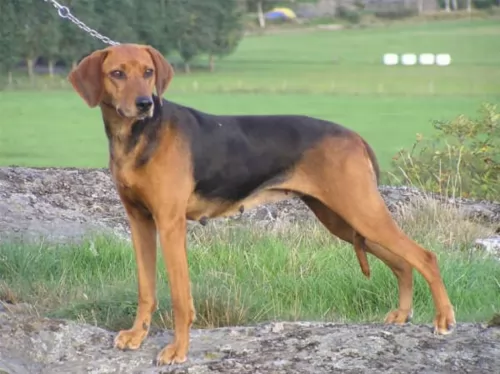 Schillerstovares are social, loving, friendly, loyal dogs who enjoy being around their human family. He’s going to need a lot of exercise, both mental and physical to keep him from boredom and frustration.
Schillerstovares are social, loving, friendly, loyal dogs who enjoy being around their human family. He’s going to need a lot of exercise, both mental and physical to keep him from boredom and frustration.
He will rely on you for at least a daily walk. He is strong-will and confident and will do well in a family where they are active and where they are firm, patient, kind and consistent in their behaviour towards him because then he ticks all th right boxes for being a splendid pet.
 There are not many health problems bothering this sturdy little dog.
There are not many health problems bothering this sturdy little dog.
The American Hairless Terrier has limited breeding stock and it is still a rare breed. Its health problems are mostly related to its hairless state. The breed is highly susceptible to sunburn, rashes, pimples, and allergies. They often need clothing in all seasons to protect them from the heat of the sun or from the cold. The skin must be cleaned regularly often daily with soap and water. This is especially true if sunscreen is used as they are open to skin infections.
Hip dysplasia is also a common issue for this small breed.
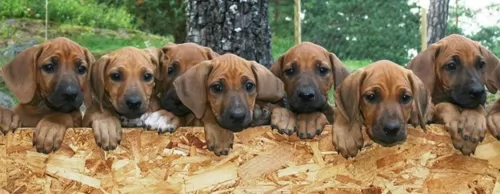 Even though your Schillerstovare is a healthy dog breed, hip dysplasia is a common dog disease that many dogs get.
Even though your Schillerstovare is a healthy dog breed, hip dysplasia is a common dog disease that many dogs get.
This is a skeletal disease when a dog’s hip joints become partially dislocated. It can be very difficult for your dog to get around, and he can also develop arthritis. It gets very sad when your dog doesn’t even want to participate in games anymore.
 The American Hairless Terrier has some food needs that might be different from other breeds. They should not be given food that contains soy, wheat or corn. They need to be fed at least 3-4 times a day in small amounts as puppies and twice a day as adult. Be sure to avoid overeating and obesity.
Puppies need about 400 calories a day whether you feed four times or two times. The adult American Hairless Terrier needs about 500-600 calories per day. This might be half a cup to a cup per day.
The American Hairless Terrier has some food needs that might be different from other breeds. They should not be given food that contains soy, wheat or corn. They need to be fed at least 3-4 times a day in small amounts as puppies and twice a day as adult. Be sure to avoid overeating and obesity.
Puppies need about 400 calories a day whether you feed four times or two times. The adult American Hairless Terrier needs about 500-600 calories per day. This might be half a cup to a cup per day.
As previously mentioned the American Hairless Terrier has skin health issues and is also prone to hip dysplasia.
This is a great breed for games if you make them small to match his size. He is energetic, athletic and playful. He loves agility, lure chasing and barn hunt activities. They need a good half hour of vigorous exercise per day.
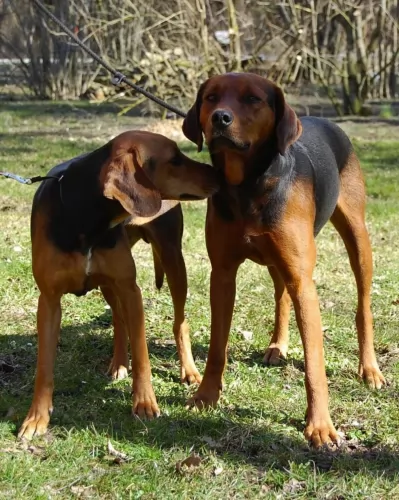 With his short coat, the Schillerstovare is considered a low maintenance dog and requires a minimal amount of grooming. Brushing should be done twice a week to remove loose hair. The harsh outer coat seems to repel dirt and dust.
With his short coat, the Schillerstovare is considered a low maintenance dog and requires a minimal amount of grooming. Brushing should be done twice a week to remove loose hair. The harsh outer coat seems to repel dirt and dust.
Trim your pet’s nails, check inside his ears for signs of redness, make sure his eyes are bright and clear and make sure he doesn’t have any unusual lumps on him.
Make sure his vaccines are up to date to avoid deadly canine diseases. Take him to the vet when you suspect he isn’t his normal self.
Dogs, just like humans, do well on good, nutritious diets. Feed a human lots of junk food and sweets and they’ll grow up to be obese and unhealthy. That's exactly how it is with dogs too. Some of the best commercially manufactured dog foods are convenient and they can be good if you look at the top brands. Look for ones that cater for your dog’s age, size, breed and activity levels. This dry kibble can be made more inviting for your pet when you include some homemade food.
Dogs just want simplicity so that they don’t battle with digestive problems. Boiled chicken, sweet potatoes, brown rice or pasta, carrots and spinach will be wonderful for him when you chop the food up and add it into the dry kibble twice a week. See his tail wag and his brown eyes light up when he smells this treat. Some raw meat added up occasionally will also contribute to your pet’s heath.
Make sure he is never without a constant supply of fresh, cool water.